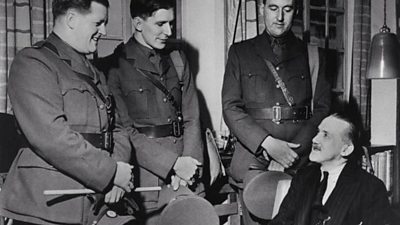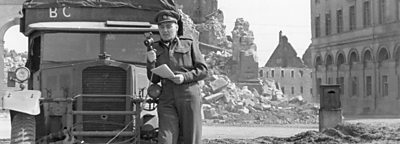Frank Gillard recording a VE Day picture of Kassel.
Keeping the nation informed
The importance of news from the Βι¶ΉΤΌΕΔ during the war cannot be overestimated. For the first 18 years of its life the Βι¶ΉΤΌΕΔ had been largely kept out of the newsgathering business. Powerful newspaper owners had persuaded the Postmaster General that news was not the business of broadcasting, and the newspapers had called the tune. The Βι¶ΉΤΌΕΔ had been obliged to take its news from the newspaper agencies, and it could not put out any bulletins before 6.00pm.
But the war changed everything. This was in part because newsprint was rationed (which meant newspapers were scarce), but it was also because people were so hungry for news. Everyone knew someone on the front line, everyone wanted to know how the war was progressing, and they did not want to wait for the newspapers.
The Βι¶ΉΤΌΕΔ news operation expanded rapidly, with newspaper journalists moving over to join the Corporation. Soon half the adult UK population was listening to the 9 o'clock news. Indeed, water company records suggest that they tended to wait until after the news to "spend a penny" or put the kettle on.

And the news was not always good. The Βι¶ΉΤΌΕΔ concerned itself with telling people "how it is", and at times the reports were gruesome and difficult to bear.
At first, the journalists had little to report, because this was the "phoney war" - the lull before the storm, when no direct threat to the UK was apparent. Reporting was hard work for correspondents such as Richard Dimbleby, stationed in France , who was often asked to provide "colour" in the absence of content.
But in the spring of 1940, the war took on a new complexion with the Nazi invasions of Norway, Denmark and the Low Countries. British forces suffered heavy losses on the beaches of Dunkirk. On 14th June the Germans marched into Paris, and for Britain, suffering almost nightly bombing raids, the outlook was bleak.
War reporting is always difficult, and more so when the news is bad. At one point Churchill was so disaffected with the Βι¶ΉΤΌΕΔ that he referred to it as 'the enemy within the gates'.
War reporting was, of course, unfamiliar territory for most of the correspondents and indeed listeners, and Charles Gardner's vivid account of a dogfight over the Channel caused a particular stir.
One listener thought the style was more appropriate to a Derby racing commentary, another said it was 'revolting to all decent citizens', and inside the Βι¶ΉΤΌΕΔ 'reservations on phraseology and technique' were expressed. But the verdicts of the Daily Mail ('grand') and the Guardian ('brilliantly exciting') were shared by listeners in America – no bad thing at a time when Britain was trying to engage US support.
The Battle of Britain proved a particular test. The Βι¶ΉΤΌΕΔ had to be vague about the damage caused by enemy raids - for example, "Heavy bombing on the east coast" was often as specific as a report could be - to play down the impact and value of such attacks, and to prevent the Luftwaffe from learning which of its sorties had found the target.
The war in North Africa was no less difficult. The first desert correspondent was Richard Dimbleby who, operating on his own, placed himself in the thick of the action - and therefore danger. He came out unscathed, but his colleague Edward Ward, who joined him later in the campaign, was less fortunate, becoming a prisoner of war.
Two other great war correspondents, Godfrey Talbot and Frank Gillard, also made their names in North Africa. Gillard worked closely with the legendary General Montgomery, who understood the value of broadcasting and used it very effectively to raise morale among his troops. He told Gillard that broadcasting was the "the fourth arm" of warfare.
Talbot, with a massive recording truck nicknamed "Belinda", covered some of the most memorable battles of the war, including El Alamein and, later, Monte Cassino in Italy. He was on the spot when, on 5th June 1944, the Allies marched into Rome, and he described to listeners at home the rapturous crowds that greeted them. This was the first capital city of Europe to be freed, and the breakthrough swept almost all other news out of the Βι¶ΉΤΌΕΔ's bulletins.
